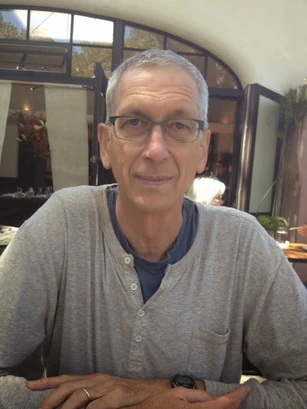"The names of the minerals and the minerals themselves do not differ from each other, because at the bottom of both the material and the print is the beginning of an abyssmal number of fissures. Words and rocks contain a language that follows a syntax of splits and ruptures. Look at any word long enough and you will see it open up into a series of faults, into a terrain of particles each containing its own void. This discomforting language of fragmentation offers no easy gestalt solution; the certainties of didactic discourse are hurled into the erosion of the poetic principle." Clark Coolidge's proposal to read a long work-in-progress for two hours of each of seven successive nights was a bold assertion of confidence in the listenability of the work and in his own stature as a poet. The analogy for such a run would be the jazz date, like, say, Bird at Minton's, where an artist would be booked into a club for a week. Keystone Korner is a local survivor in this tradition. But for a poet such a run would normally be unthinkable, given the huge number of readings going on about (Poetry Flash lists several every night), and for Coolidge, who has not sought celebrity status and whose work is little known outside of a small (but growing) community of readers, there was an element of risk involved. Coolidge ran the risk of being alone with his work but, happily, got a decent turnout. Attendance was highest on opening and Saturday nights, but other sessions saw a constant, shifting flow of new and familiar listeners. Of the sum total of 144 people in attendance during the week, I was seven. Each night Coolidge read two sections from the prose work he has been writing for the past five years. The work is unfinished, projected to run a thousand pages, and as yet untitled. The Coolidge reading style is faultless, in the sense of unbroken. The tone is dry, slightly sardonic, in the manner of William Burroughs, but without the histrionics, only an occasional retard of a long last syllable for emphasis. His delivery is non-stop, pushing out three or four sentences per breath, mouth nearly touching the microphone, eyes glued to the page. His timing is precise and spontaneous, he interprets the page as a score for voice, paying close attention to the placement of stress. The rhythmic elements of the work build like a jazz solo, setting up structures, like fours, heard in the head, then violating them by swiveling onto new time schemes, so the measure's a continual revamping. The nature of the work itself is, to say the least, elusive. The words suggest certain subject areas of concern (caves, geology, music, childhood, writing, language, etc.), but the sentences seem to undercut their own connotations. One hears arguments, lists, descriptions, expressions, even dialogs being made, but their terms are somehow displaced. The effect is of a constant tension, a leaning forward toward a resolution which never entirely arrives. Or an equilibrium is established, only to be immediately upset. As the work veers off from direct statement, the audience feels the limits of its attention, stretches to hear the words. Bereft of simple narrative landmarks, expectation finds itself aghast. At the same time the immaculate distance Coolidge seems to maintain between himself and the work sets it off equally from the audience, so there is no sense of direct manipulation, but rather that one is free to encounter the work 'at one's leisure' as it proceeds along. This made for a fairly relaxed kind of listening. Since the work was equally accessible at any point, there was no necessity of following it. The rhythm of the words was so strong that sound became sense. The listener was at ease to drift in and out without fear of having missed something. Members of the audience looked about the room, occasionally exchanged glances, and, as the week proceeded, scribbled increasingly in notebooks. |
Wednesday, November 24, 2021
Kit Robinson ON Clark Coolidge
Subscribe to:
Post Comments (Atom)
Barbara Guest
Santa Fe Trail I go separately The sweet knees of oxen have pressed a path for me ghosts with ingots have burned their bare hands it is th...

-
David Doyle & David Melnick Men in Aida, a three-part project of which only the first volume has appeared in book form (Tuumba, 1983)...
-
Foreword Not four, but a score. Little magazines are not supposed to last that long. They are the mayflies of periodicals. Nowadays, a lot...

No comments:
Post a Comment